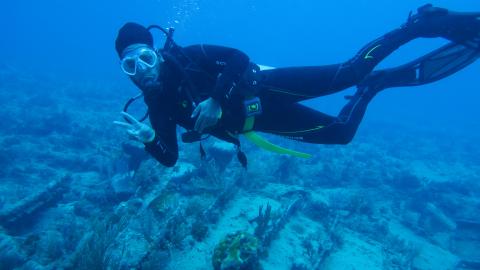
Justin Dunnavant
What is your history of engagement with the National Geographic Society?
I was nominated as a member of the 2021 Emerging Explorer (Wayfinder Award) 2021 Cohort.
Tell us about your work/research. What kinds of things do you do?
As an archaeologist I spend a lot of time digging, analyzing artifacts and trying to draw connections between the past and the present. I also do underwater archaeology which has me diving to document shipwrecks. While these are the most exciting parts of my job, they only account for a small fraction of my day-to-day work. During the year I teach as a university professor and spend a lot of time reading and writing about the people, places, and experiences where I work.
What sparked your initial interest in your career?
After living in the rainforests of Belize as a freshman in college I was enthralled by the idea that my job would allow to travel and uncover so many stories and experiences.
What element of your work/study is the most fascinating?
The most fascinating part of my work is the ability to travel to interesting places, meet amazing people, and recover pieces of our past.
What other jobs or skills led you to your current career?
In addition to my work as an archaeologist, I worked as an oral historian archiving community histories and a lab assistant, curating biological collections at my university.
What are your degrees and certifications?
Bachelor of Arts in History and Anthropology - Howard University 2009; Masters of Arts - University of Florida 2014; Doctorate of Philosophy - University of Florida 2017.
What are your hobbies?
I love to play speed chess and I've been skateboarding since I was 8 years old. I recently started trying my legs at surfing.
What advice would you give someone who wants to have a career like yours?
If you want to become an archaeologist, visit your local historic sites, museums, or archaeological digs and see if they can use some help. It's a good way to get your hands in the field and see which part of archaeology you'd like to learn more about and potentially specialize in. There is so much history to learn and study.
Expeditions
Justin participated in the following Ocean Exploration Trust expeditions:

